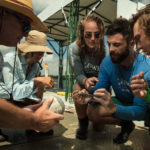UWF addresses workforce shortage in STEM fields with three new degree programs
The University of West Florida is launching three new degree programs in direct response to increased workforce demand in STEM fields. Beginning in Fall 2019, UWF will offer a Master of Science in Cybersecurity; Master of Science in Engineering; and Bachelor of Science in Instructional Design and Technology. The UWF Board of Trustees approved the programs at its quarterly meeting held on March 20, 2019.

“At UWF, we listen to community and industry needs and create relevant degrees for our students,” said UWF President Martha D. Saunders. “We are confident our students will emerge from these programs fully prepared to contribute to the workforce.”
The graduate degree programs in cybersecurity and engineering will be housed within UWF’s Hal Marcus College of Science and Engineering.
“Offering these new degree programs demonstrates UWF’s continued mission to expand academic disciplines in a thoughtful way, and we are eager to see the positive outcomes of this initiative,” said Dr. George Ellenberg, provost and senior vice president.
The establishment of the new master’s degree in cybersecurity within the Department of Computer Science demonstrates UWF’s commitment to address the critical cybersecurity workforce shortage across the nation. The U.S. Bureau of Labor Statistics predicts a 28 percent growth in jobs for this field nationally through 2026. In addition to industry demand, the program is a result of student demand and input from the Computer Science Industrial Advisory Board. UWF currently offers a Master of Science in Information Technology-Cybersecurity specialization, which has doubled in enrollment numbers in the last three years.
UWF is designated as a Center of Academic Excellence in Cyber Defense Education by the NSA and DHS and serves as one of eight Cybersecurity CAE Regional Resource Centers across the nation. This program prepares graduates to be leaders in the protection of data assets and in the analysis of potential threats to systems and networks.
The fully online program will offer foundational coursework for students entering the program from fields other than computer science or computer engineering. Students will gain fundamental knowledge and skills in the techniques, policies, operational procedures and technologies that secure and defend the availability, integrity, authentication, confidentiality and non-repudiation of information and information systems and the development of secure software systems.
“The students within the Hal Marcus of College Science and Engineering are here to seize opportunities, learn new ways of innovation and be at the forefront of technological advances,” said Dr. Jaromy Kuhl, dean of the Hal Marcus College of Science and Engineering. “As we add new programs, we’re mindful of the impressive need for expertise in various engineering specializations. UWF has the resources to deploy a highly-skilled workforce of the future, and we’re making it our mission to do so.”
UWF’s Department of Electrical and Computer Engineering and the Department of Mechanical Engineering are collaborating to offer a Master of Science in Engineering. With one of the highest concentrations of engineering jobs in the nation, Northwest Florida is home to numerous military bases, technology companies, and research laboratories that need engineers with advanced degrees.
The program will be a blend of face-to-face, synchronous learning and online courses offered at the UWF Pensacola campus and the Emerald Coast location. Graduates from the program can work in a variety of high-technology industries such as renewable energy, power grid protection, robotics, autonomous vehicles, advanced manufacturing, defense and transportation. Job positions may include senior/lead engineer, engineering project manager and design/product engineer.
“One unique aspect of the College of Education and Professional Studies is that it prepares students for diverse, multifaceted careers in a variety of fields,” said Dr. William Crawley, dean of the UWF College of Education and Professional Studies. “Graduates will have the ability to address complex problems from the perspective of education, training and performance improvement. There’s a true industry need for this, and UWF graduates will be able to fulfill positions right out of the program.”
The Bachelor of Science in Instructional Design and Technology will be housed in the Department of Instructional Design and Technology within the College of Educational and Professional Studies. The program will prepare graduates for positions in training and development across a variety of sectors including education, industry, government, military and healthcare to support the need for more entry-level personnel in the field.
For more information about the new degree programs, visit uwf.edu.


